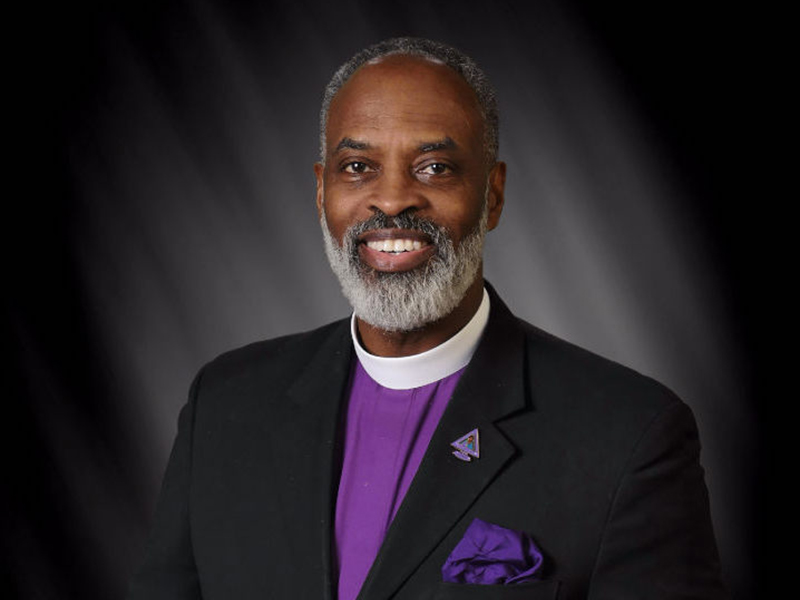(RNS) — A prominent African Methodist Episcopal Zion Church leader has been removed from the ranks of bishop after being found guilty in a church trial for mishandling millions of dollars in transactions related to congregations.
Staccato Powell, who was the bishop of the denomination’s Western Episcopal District, had been suspended until the time of his trial, which was held on Wednesday (July 28) during the first day of the AME Zion Church’s hybrid General Conference in Atlanta.
According to the single page of official minutes from the trial proceedings, which were held in executive session, Powell is no longer a bishop.
“The jury found Bishop Staccato Powell guilty on all 20 counts,” the minutes read. “The Trial Committee recommended Bishop Staccato Powell be disrobed, meaning Bishop Staccato Powell would no longer be recognized as consecrated to the office of Bishop, and would be remanded to the Central North Carolina Conference as only an ordained Elder.”
The recommendation was adopted.
“Bishop Michael Frencher (of the Southwestern Delta District) offered prayer for Bishop Powell, his family, and the A.M.E. Zion Church,” the minutes also state, noting the executive session ended at 1:33 a.m. on Thursday.
RELATED: African Methodist Episcopal Zion Church celebrates paid-off debts at major meeting
Powell, in an interview with Religion News Service on Friday (July 30), said he still considers himself a bishop but added he left the AME Zion Church — “both physically and otherwise” — when he was requested to depart the gathering after the trial concluded. He said he has no regrets — “not at all” — about the accusations made against him and has plans for new Christian work.
“I’m confident that this is the providential move of God, that I would not have had the opportunity to do ministry in the way that I’m convinced God is leading me to do ministry within the bounds of the church of my birth,” he said. “I have no animus — nothing. I feel that God has moved in a mighty way and what some may have intended to be adversarial and evil God will use ultimately not just for my good but for the good of his people.”
The denomination’s board of bishops said in a statement that the General Conference conducted “a fair trial, reviewing extensive documentary evidence, hearing witnesses, and providing opportunity for a full defense” before the vote was taken to convict Powell.
“A core principle of Methodism is accountability. No position, regardless of prominence, is beyond this proposition,” the board said. “While we grieve the circumstances, personal ethical lapses, and erroneous judgment that placed us in this difficult position, we are grateful for the historic and overwhelming affirmation of our standards of mutual accountability.”
In January, the bishops announced Powell’s immediate suspension as an active bishop pending the trial’s outcome.
“The gravity of this action weighs heavily upon your Board of Bishops and we grieve that the severe infractions and maladministration of Bishop Powell have left us with no alternative to this action,” that announcement reads.
The board said in January that the alleged mismanagement related to church mortgage funds and that “the accounting for more than $8 million remains unreported. These transactions have the potential to place enormous debt upon our denomination.”
In the January statement, the board of bishops said it had received complaints since 2017 about actions taken by Powell that conflicted with church law.
“These actions included, but were not limited to the demand that pastors amend church deeds so that the Western Episcopal District, Inc. be named as title holder,” the board said.
Powell had been leader of a denominational district that included half a dozen states. But a bankruptcy judge, writing in May 2021, said Powell incorporated a separate “AME Zion Western Episcopal District” that was not authorized by the denomination.
“Some churches acquiesced to Bishop Powell’s request to sign over church property to this newly created entity; others did not,” wrote U.S. Bankruptcy Judge Fredrick E. Clement of the Eastern District of California. “Not to be deterred, in 2016-2017, Bishop Powell removed each of the Presiding Elders within the district.”
The bankruptcy court said “a number of churches” who turned deeds over to the district Powell had incorporated received default notices; and at least one lost its property after it faced foreclosure.
Prior to this week’s church trial, AME Zion officials had continued their investigation of the former bishop. The written report of the Connectional Budget Department noted it had paid 2020 accounting and legal fees totaling $119,525 related to “an ongoing investigation of real estate transactions” in the denomination’s Western region of the U.S. It added that an additional $209,000 has since been spent on the same investigation.
Powell, a longtime ecumenical leader — who once served as a deputy general secretary of the National Council of Churches and worked with different Black Methodist denominations as well as the World Council of Churches — had been named president of the board of bishops in early 2020.
In January, responding to the bishops’ announcement, Powell told Religion News Service in a statement he was “confident this matter will be resolved in a favorable manner” and questioned the steps the bishops had made, saying they were “antithetical” to the Bible and to due process.
“The underlying libelous, slanderous and ambiguous document is based on inaccurate, and incomplete information as well as innuendos which have lead to faulty interpretations, unsubstantiated claims, and false assumptions giving rise to implications of malicious intent,” he added.
This story has been updated to include new comments by Staccato Powell.
RELATED: From New York to Alabama, blacks worshipped in own spaces before slavery’s end





